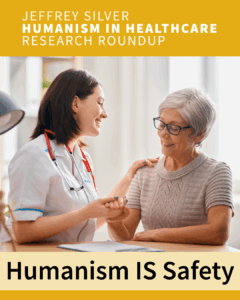At the end of every month, The Arnold P. Gold Foundation compiles the Research Roundup, a list of recently published studies on humanism in medicine. If you would like to be notified each time these are published, send an email to bking@gold-foundation.org with the subject line “Subscribe RR”.
Electronic medical records and physician stress in primary care: results from the MEMO Study
Babbott S, Manwell LB, Brown R, Montague E, Williams E, Schwartz M, Hess E, Linzer M.
J Am Med Inform Assoc. 2013 Sep 4. [Epub ahead of print]
Researchers compared groups of physicians with low, moderate and high Electronic Medical Record (EMR) use. For physicians with high EMR use, “time pressure was associated with significantly more burnout, dissatisfaction and intent to leave than in low or moderate EMR use groups.
Higher quality communication and relationships are associated with improved patient engagement in HIV care
Flickinger TE, Saha S, Moore RD, Beach MC.
J Acquir Immune Defic Syndr. 2013 Jul 1;63(3):362-6.
Over 1,300 patients rated the quality of communication and relationships with their providers in 5 domains. Researchers found that “patients kept more appointments if providers treated them with dignity and respect, listened carefully to them, explained in ways they could understand, and knew them as persons. Being involved in decisions was not significantly associated with appointment adherence.”
The development and evaluation of a compassion scale
Martins D, Nicholas NA, Shaheen M, Jones L, Norris K.
J Health Care Poor Underserved. 2013;24(3):1235-46.
Researchers developed and evaluated the psychometric properties of a 10-item self-report measure of compassion. “The scale is user-friendly, easy to score, and characterized by good psychometric properties. It can be used to foster understanding of the impact of compassion on disease and outcomes across social networks/relationships.”
An interactive individualized intervention to promote behavioral change to increase personal well-being in US surgeons
Shanafelt TD, Kaups KL, Nelson H, Satele DV, Sloan JA, Oreskovich MR, Dyrbye LN.
Ann Surg. 2013 Aug 23. [Epub ahead of print]
1,150 surgeons gave a subjective assessment of their well-being relative to their colleagues and also received a score based on the Mayo Clinic Physician Well-Being Index. “A majority of participants (89%) believed that their well-being was at or above average, even though 70% had scores in the bottom 30% relative to national norms. After receiving objective, individualized feedback, half of the surgeons indicated that they intended to make specific changes as a result.”
The medical alliance: from placebo response to alliance effect
Verhulst J, Kramer D, Swann AC, Hale-Richlen B, Beahrs J.
J Nerv Ment Dis. 2013 Jul;201(7):546-52.
“The placebo effect is the result of a deliberate or incidental suggestion of clinical benefit, whereas the alliance effect is the result of increased confidence and hope, induced by a deliberately pursued professional medical alliance between a patient and a physician.” In this paper, the authors present a comprehensive model of the medical alliance and review its relevance for clinical practice and medical education.

This post was written by Brandy King, Head of Information Services at The Arnold P. Gold Foundation Research Institute



